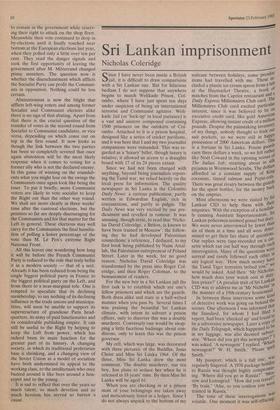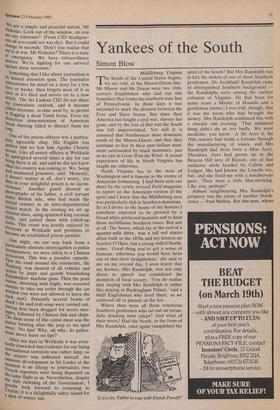Sri Lankan imprisonment
Nicholas Coleridge
C ince I have never been inside a British ■ ...) jail, it is difficult to draw comparisons with a Sri Lankan one. But for hilarious bedlam I do not suppose that anywhere begins to match Welikade Prison, Col- ombo, where 'I have just spent ten days under suspicion of being an international terrorist and Communist agitator. Weli- kade Jail (or lock-up' in local parlance) is a vast and austere compound containing 1500 prisoners on the outskirts of Col- ombo. Attached to it is a prison hospital, designed like a series of cricket pavilions, and it was here that I and my two journalist companions were remanded. This was re- garded as a 'luxury' billet, though luxury is relative; it allowed us access to a draughts board with 17 of its 24 pieces extant.
Since we had not been charged with anything, beyond being journalists report- ing the Tamil war, we relied heavily on the local press for information. The quality newspaper in Sri Lanka is the Colombo Daily News: a curious publication, partly written in Edwardian English, rich in conjunctions, and partly in pidgin. The Daily News was very excited by our pre- dicament and revelled in rumour. It was amusing, though eerie, to read that 'Nicho- las David Coleridge, a Briton, is known to have been trained in Moscow'; the follow- ing day he had developed Palestinian connections: a reference, I deduced, to my first book being published by Naim Attal- lah, the Palestinian entrepreneur of Poland Street. Later in the week, for no good reason, Nicholas David Coleridge was transformed by the press into Roger Col- eridge, and then Roger Coleman, to the bemusement of readers.
For the new boy in a Sri Lankan jail the first task is to establish which are one's fellow prisoners and which are the guards. Both dress alike and stare in a half-witted manner when you pass by. Several times I was praising the beautiful Sri Lankan climate, with intent to subvert a prison officer, only to discover this was a double murderer. Conversely one would be swap- ping a little facetious badinage about con- ditions, only to learn this was the prison governor.
My cell, which was large, was decorated with three pictures: of the Buddha, Jesus Christ and Miss Sri Lanka 1964. Of the three, Miss Sri Lanka drew the most comment. The double murderer, our tea boy, has plans to seduce her when he is released in 18 years' time. By then Miss Sri Lanka will be aged 61.
When you are checking in at a prison most of your belongings are taken away and meticulously listed in a ledger. Since I do not always unpack to the bottom of my
suitcase between holidays, some peculiar items had travelled with me. These in- cluded a plastic ice cream spoon from a tub at the Haymarket Theatre, a book of matches from the Caprice restaurant and a Daily Express Millionaires Club card. The Millionaires Club card excited particular interest, since it was believed to be an executive credit card, like gold American Express, allowing instant credit of a million pounds. Despite the painstaking inventory of my things, nobody thought to frisk our suit pockets, so we were still in hapPY possession of 2000 American dollars. This is a fortune in Sri .Lanka. Prison guards earn three dollars a week, so we felt rather like Noel Coward in the opening scenes.of The Italian Job, strutting about in silk pyjamas in Wormwood Scrubs. The dollars afforded us a constant supply of King coconuts, tinned salmon and Pepsi-cola. There was great rivalry between the guards for the spent bottles, for the money back on the empties. Most afternoons we were visited by Si Lankan CID to help them with their enquiries. With the exception of a fiendish: ly cunning Assistant Superintendent, Srl Lankan policemen seemed genial but dozY. We were never interviewed by fewer than six of them at a time and all were deter- mined to get their fair share of questions' Our replies were tape-recorded on a casi, sette which ran out half way through each interrogation. Many of the questions were surreal and rarely followed each other 01 any logical way. 'How much money have the Tamil Tiger terrorists bribed you?' we would be asked. And then: 'Mr Nicholas, how much does your watch cost at dutY" free prices?' (A peculiar trait of Sri Lank'? CID was to address me as `Mr Nicholas' 01 the manner of a 19th-century housema"cl,' In between these interviews some kg' of detective work was going on behind the, scenes. One afternoon I was informed that the Standard, for whom I had Well report, had been 'checked up' and found to be a subversive newspaper. Later a copy the Daily Telegraph, which happened to be in my luggage, was also deemed subver- sive. 'Where did you get this newspaper? / ch was asked. 'A newsagent' I replied. Mill ft newsagent?' W. H. Smith.' spell Smith.' My passport, which is a full one, was regularly fingered. A 1976 package holiday to Russia was thought highly comprans_ mg. 'Where did you go in Russia?'. cow and Leningrad.' How did you travel `By train."Aha, so you confess you were trained in Russia.'
The tone of these interrogations Was volatile. One moment it was self-effacing' 'We are a simple and peaceful nation, Mr Nicholas. Look out of the window, do you see any terrorists?' (From CID headquar- ters all you could see was sky). But it could
change in seconds: 'Don't you realise that we're at war, Mr Nicholas? There is a state
of emergency. We have extraordinary Powers. We're fighting for our survival against these terrorists.'
Something that I like about journalism is RS limited attention span. The journalist concentrates his mind on a story for a few days or weeks, then forgets most of it as soon as it's filed and moves on to a new
article. The Sri Lankan CID do not share journalistic outlook, and it became
rather tiresome, as time went by, to persist 10 flogging a dead Tamil horse. Even my dexterous demonstration of American break dancing failed to distract them for long,
One of the prison officers was a particu- larly agreeable chap. His English was Perfect and we lent him Agatha Christie novels. Like all senior officers at Welikade
be.aPologised several times a day for our 'icing there at all, and said he did not know What the country was coming to. We, being it mannered prisoners, said: 'Honestly, doesn't matter at all, don't worry, ten daYs in your delightful prison is no incon- venience.' Another guard showed us
Photographs of his father, a civil servant under British rule, who had made the
ern cial century in an inter-departmental cricket match. In the evening we set up coconut nut shies, using upturned king coconut shells, and pelted them with rolled-up
socks. This event was keenly enjoyed by
become at Welikade and promises to uccome an established prison pastime.
One night, on our way back from a Particularly abstruse interrogation at police
headquarters, we were taken to a Chinese restaurant. This was a peculiar episode.
Int the road around the restaurant, the
Nanking, was cleared of all vehicles and sealed by jeeps and guards brandishing kalashnikov machine guns. Then the poor waiter, shivering with fright, was escorted outside to take our order through the car
back (we were not allowed to leave the L'ack seat). Presently several bowls of
shank's fin and crab soup were carried out, having first been dragged for secret mes- sages, followed by Chinese fish and chips.
The final scene of this comic meal was the Waiter bawling after the jeep as we sped
away: 'No tips! Why, oh why, do police- Mans never leave no tips?'
After ten days in Welikade it was even- tually that evidence for our being the terrorists was rather limp, so the. airport was indicated instead. An °Illinous development in Sri Lanka at the __Moment is an allergy to journalists; two French reporters were being deported on
the same flight as us. Nevertheless, despite the daft clowning of the Government, I
greatly look forward to returning to
Ceylon; it is a delightfully sultry island for a spot of winter sun.











































 Previous page
Previous page